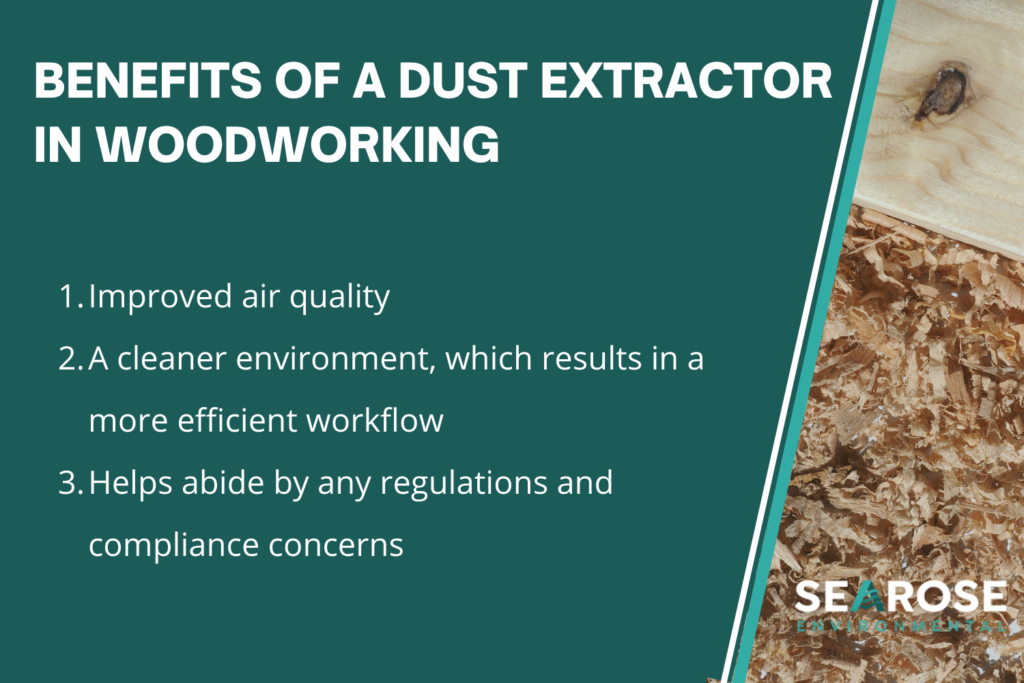Manufacturing technology today has made woodworking so much easier. Instead of the labour-intensive work it used to be, we now have all types of specialised machinery to help with sawing, shaving, and sanding tasks.
But there’s an almost invisible hazard in your woodworking workshop that you might not be aware of — wood dust. In this article, we’ll show you why you need a dust extractor for woodworking, whether it’s in your garage or an industrial workshop.
What is Wood Dust in Woodworking?
Wood dust is a common byproduct of woodworking. The thousands of tiny particles and wood shavings created during the cutting, sanding, and shaping of wood are what collectively makeup wood dust. A typical woodworking operation can produce up to 100 milligrams of wood dust per cubic meter of air.
Health and Safety Concerns
Because these particles can remain suspended in the air for extended periods, they end up polluting the atmosphere in your workshop, entering your body and lungs as you breathe. Prolonged exposure to wood dust hazards in the workplace can result in serious health consequences:
- Respiratory Issues: Inhaling wood dust can lead to respiratory problems, such as chronic bronchitis and reduced lung function.
- Allergies: Wood dust can trigger allergies and skin irritations, making your work environment uncomfortable.
- Critical Health Complications: Long-term exposure may increase the risk of developing more severe conditions, including asthma and even certain types of cancer.
How Can a Dust Extractor Help in Woodworking?
The best way to deal with wood dust is to prevent it from becoming airborne in the first place. This is where dust extractors come in. Dust extractors are equipment that collect wood dust as it is produced using a vacuum, preventing it from getting into the air. The collected wood dust is trapped with an air filter for later disposal. Using a dust extractor for woodworking can help in the following ways:
Improved Air Quality
One of the primary benefits of using a dust extractor is the significant improvement in air quality. These machines capture wood dust particles before they can become airborne, ensuring that you and your workshop breathe cleaner air.
Improved air quality, in turn, directly mitigates the health risks associated with wood dust exposure. By removing dust from the air, you reduce the chances of respiratory issues and allergies.
Woodworking Efficiency
Beyond health benefits, a dust extractor also enhances woodworking efficiency. Reduced wood dust particles result in less debris accumulation on your tools and around your workspace, leading to increased efficiency. With efficient tools and cleaner workpieces, you save both time and money in the long run.
Regulations and Compliance
Having a dust extractor may also be necessary if you are running an industrial operation, depending on applicable woodshop safety regulations and standards. Non-compliance with these regulations can lead to serious consequences, including fines and legal actions. Using a dust extractor is a proactive step towards meeting these regulations and ensuring a safe and compliant workspace.

Types of Wood Dust Extraction Solutions
When it comes to wood dust extraction, there are several solutions that cater to various needs and workshop sizes:
Portable Dust Collectors
Portable dust collectors are compact units ideal for smaller workshops. They offer flexibility, as they can be easily moved as needed. These units are particularly suitable for occasional woodworkers or hobbyists looking for efficient dust control.
Cyclone Dust Collectors
Cyclone dust collectors are highly efficient machines that utilise centrifugal force to separate wood dust and debris. These collectors are designed for larger-scale woodworking and heavy-duty applications, ensuring thorough wood dust management.
Centralised Dust Collection Systems
Centralised dust collection systems are tailor-made for industrial settings. These systems connect multiple machines to a central collector, providing comprehensive wood dust control. They are a robust choice for businesses with extensive woodworking operations.
Air Filtration Units
In addition to dust collectors, air filtration units can further enhance air quality by removing fine particles that may escape collection systems. These units are valuable in maintaining a clean and healthy workspace.
Choosing the Right Dust Extractor
There is no overall best dust extractor — selecting the right dust extractor comes down to your woodworking needs. Consider the following factors when deciding what type of dust extractor to have in your workshop:
- Capacity: Ensure that the chosen extractor can handle the volume of dust produced in your workshop effectively. If your workshop processes a lot of wood, you will need a more comprehensive dust extraction system.
Take into consideration the amount of dust you accumulate in your workshop
- Filter Efficiency: The filter quality of a dust extractor will affect its ability to collect wood dust. High-efficiency filters are better suited for capturing even the finest dust particles, which may be essential in improving quality control.
- Budget: The more extensive a dust extraction system you need, the more it will cost. Set a budget and explore options that offer the best value for your investment.
Still unsure what kind of dust extraction your woodworking outfit needs? Seeking guidance from industry experts can help you make an informed purchase decision that aligns with your specific woodworking needs.

Final Thoughts
Don’t underestimate the dangers of wood dust — it is always a good idea to invest in a dust extractor to optimise your workshop’s efficiency and safeguard the health of your workers and yourself.
As a leading supplier of dust extraction solutions, Searose Environmental has the expertise to advise you on how you can create a safer, cleaner, and more productive woodworking environment with a customised dust extraction system. Contact us today and get a free quote for a dust extraction solution for your business.
